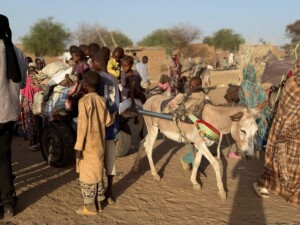UN S-G António Guterres welcomes efforts of AU-IGAD-UN Trilateral Mechanism ‘to facilitate a solution to the political crisis in Sudan’
The Secretary-General of the United Nations, António Guterres, has welcomed the efforts of the Trilateral Mechanism of the United Nations Integrated Transition Assistance Mission in Sudan (UNITAMS), African Union (AU), and Intergovernmental Authority on Development (IGAD), to facilitate a solution to the political crisis in Sudan.
The Secretary-General of the United Nations, António Guterres, has welcomed the efforts of the Trilateral Mechanism of the United Nations Integrated Transition Assistance Mission in Sudan (UNITAMS), African Union (AU), and Intergovernmental Authority on Development (IGAD), to facilitate a solution to the political crisis in Sudan.
A statement issued from New York today by the spokesman for the Secretary-General, Stéphane Dujarric, says that as Sudanese stakeholders prepare to engage in direct talks, the Secretary-General “encourages them to participate in good faith and to continue to work towards establishing a conducive environment for a constructive dialogue in the interest of the Sudanese people”.
The statement stresses that “the Secretary-General condemns all calls for violence and reiterates the importance of a peaceful atmosphere for the talks to be successful. He is also concerned about attempts to undermine the efforts of the trilateral mechanism and its envoys”.
‘All forms of hate speech represent an attack on tolerance, undermine social cohesion and can lay the foundation for violence, setting back the cause of peace…’
The Secretary-General also recalls that “all forms of hate speech represent an attack on tolerance, undermine social cohesion and can lay the foundation for violence, setting back the cause of peace. He reaffirms his strong support for the work of UNITAMS, as it continues to support the Sudanese aspirations for democracy, peace and prosperity”.
The AU-IGAD-UN Trilateral Mechanism was launched on Thursday, May 12 to support Sudan through the next phase of the political process, and to facilitate a Sudanese-led political process with the aim of restoring a civilian-led transition to democracy.
Some rebel movements and protest groups, including the Forces for Freedom and Chance (FFC) and the Resistance Committees of Khartoum, refuse to participate in the initiative or take part in any dialogue with the military coup authorities and those who support them as they fear that this will legitimise the coup.
UNITAMS mandate extended
Last week, the United Nations Security Council (UNSC) extended the mandate of UNITAMS until June 3, 2023. The mission, which replaced the United Nations-African Union Mission in Darfur (UNAMID) peacekeeping force, to assist Sudan “in its transition towards democratic governance, provide support for peace negotiations and bolster efforts to maintain accountable Rule of Law and security institutions”.
Relations between the government of Sudan and UNITAMS have been strained recently, following the March 29 briefing by UNITAMS head Volker Perthes to the UN Security Council (UNSC) about Sudan’s deteriorating economic, humanitarian, and security situation. Perthes pleaded with the UNSC, saying: “Time is not on Sudan’s side, and I speak to you today with a sense of urgency which is also increasingly felt by Sudanese stakeholders concerned about the stability and the very existence of their country.”
As retort, the Sudan Ministry of Foreign Affairs said that UNITAMS “should focus on the other basic aspects of its mandate, instead of focusing most of its activities on only the political side”.
The head of Sudan’s ruling junta, Gen Abdelfattah El Burhan, subsequently threatened to expel Perthes from Sudan, accusing him of “overstepping the mandate of the UN mission” and interfering in Sudanese affairs.
Last month, Acting Undersecretary of the Sudan Ministry of Foreign Affairs, Ambassador Nader Yousef El Tayeb, handed over a matrix to members of the UN Security Council in New York, that includes the government’s requirements from UNITAMS to assist with democratic transition in Sudan.
Ambassador El Tayeb, who was visiting New York to meet with the leadership of the United Nations and some member states of the UN Security Council, met with UN Under-Secretary-General for Political and Peacebuilding Affairs, Rosemary DiCarlo. According to the official Sudan News Agency (SUNA), El Tayeb indicated that all the competent authorities in Sudan have participated in the development of a comprehensive matrix that includes the vision of the government of Sudan for the role that UNITAMS should play in accordance with its mandate.
Human rights concerns
At the conclusion of his four-day visit to Sudan last week, the UN Expert on Human Rights in Sudan, Adama Dieng, expressed his deep concern at the human rights situation in the county. He criticised the human rights violations documented since the coup d’état on October 25 last year, the worsening of economic and social rights since the coup, and in a press conference in Khartoum before leaving the country this afternoon.
The main purpose of Dieng’s visit was to continue talks with the authorities on human rights concerns linked to the coup, follow up on the recommendations he made during his visit in February, and hear from civil society and victims of human rights violations.
Dieng said in his statement that he was shocked by the killing of a young man yesterday during the protests to mark the violent dispersal by security forces of the 3 June pro-democracy sit-in in Khartoum in 2019.











 and then
and then